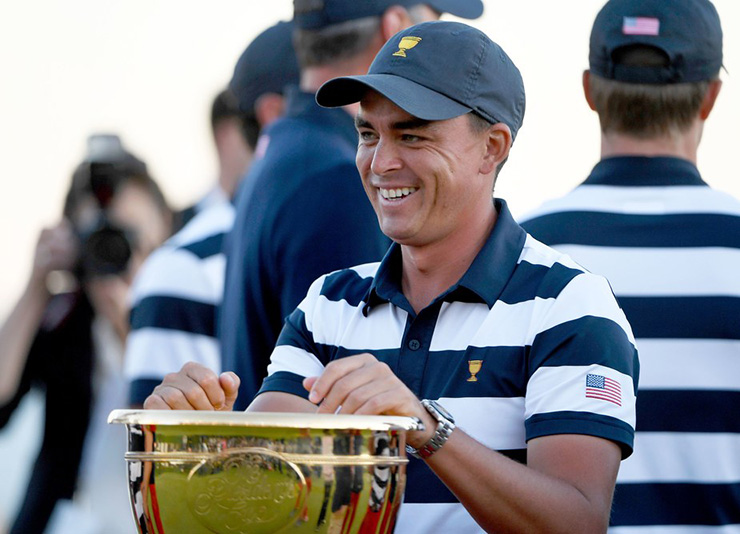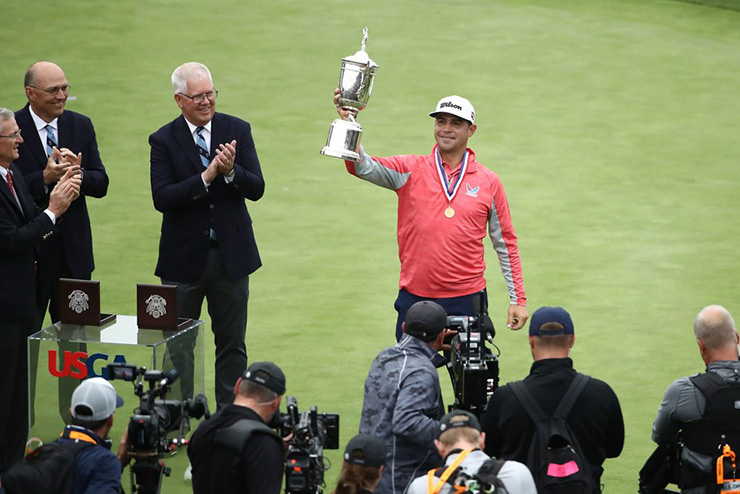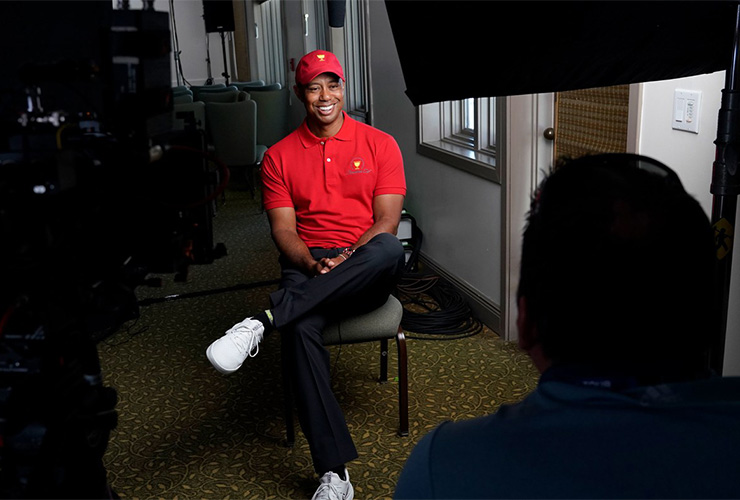By John Feinstein
In 1993, after the United States had rallied on Sunday to win a dramatic Ryder Cup—the last time the Americans won in Europe—Seve Ballesteros and Nick Faldo sat together during that night’s press conference. Bernard Gallacher had captained Europe to two close losses, and someone asked Europe’s two biggest stars who should lead the team at Oak Hill in two years. With a wide smile, Ballesteros said, “It should be Nick. I think he’d do a great job.”
“What?” Faldo said, genuinely shocked and a little concerned that Ballesteros was serious. “You want me to decide who to put in the team, get everyone ready to play, decide who is going to play each day and win my matches? No way.”
Gallacher captained Europe again two years later, and Europe won—with Faldo coming from behind to beat Curtis Strange in a crucial singles match.
The last time a Ryder Cup captain played in the matches was 1963, when Arnold Palmer was a playing captain for the U.S. team. That was long before the Ryder Cup expanded from Great Britain & Ireland to include all of Europe in 1979, and the matches went from “hit-and-giggle” golf, as Jack Nicklaus once put it, to very serious business. That year was also only the second time the matches were 18 holes apiece—as opposed to the 36 they’d been through 1959.
Here is the list of Presidents Cup captains who also have played in the matches since they began in 1994: one. Hale Irwin went 2-1 for the Americans in the inaugural event at Robert Trent Jones Golf Club, a 20-12 U.S. victory.
And that’s the way it should stay, especially if the PGA Tour wants the Presidents Cup to be taken more seriously, which—to put it mildly—it wants to see happen.
There has been talk all fall that Tiger Woods might name himself as one his team’s four captain’s picks for the matches in December, which will be played in Melbourne—the only place where the International team has ever won.
There’s no doubt the tour would love to see Woods play, and so would the TV networks that will televise the matches in the middle of the night because of the 16-hour time difference between Melbourne and the East Coast of the United States.
But there are a myriad of reasons Woods shouldn’t name himself. Let’s start with his health—which is always an issue. The week before the matches, Woods is going to play four rounds in the exhibition he and his foundation run in the Bahamas. Then he has to fly across the world to Australia and, if he’s playing, will need to play practise rounds and tee it up as early as Thursday, if he puts himself in the lineup on the first day.
That might not sound terribly daunting, but Woods has said he needs to pick his spots to play as he approaches his 44th birthday with a back that’s always going to be a question mark. There’s no need for him to play in Australia. His only playing goal right now should be to prepare for the Masters.
He has no choice but to play in the Bahamas. He has a choice at Royal Melbourne.
There’s also this: If Woods picks Woods, he will have to jump himself over someone who finished ahead of him in the Presidents Cup points standings. Tony Finau, Gary Woodland, Rickie Fowler and Patrick Reed finished ninth through 12th. Woods was 13th.
There are those who want to see Woods play who are making the case that Woodland has done little since his U.S. Open win in June—though he did finish T-5 in last week’s CJ Cup @ Nine Bridges in South Korea. But Woods has done close to nothing since his dramatic Masters win in April—and he had knee surgery two months ago.
Reed, Fowler and Finau all have Ryder Cup experience—Woodland does not. Neither does Kevin Na, who has been mentioned as a possible pick with his win last month in Las Vegas.
Fowler’s first Ryder Cup was in 2010, and he quickly became a U.S. team fixture (except in 2012, when he was injured for much of the year), even when he didn’t make a team on points (2016 Ryder Cup), because he’s so well-liked and plays such an important role in the team room.
“There was never any doubt I was going to pick Rickie,” said Davis Love III, the U.S. captain at Hazeltine National. “There’s no one he can’t play with, and he helps everyone relax in the team room.” His selection by Woods, then, seems more than reasonable.

Fowler smiles while looking at the trophy after the U.S. defeated the Internationals, 19-11, at the 2017 Presidents Cup. (Chris Condon/PGA Tour)
It’s probably important for Woods to put Reed on the team for a reason 180 degrees different than Fowler: Reed has had trouble fitting into the U.S. team room at times. In 2014, when Phil Mickelson spoke on Saturday night to Reed’s first Ryder Cup team, he looked at Reed and said, “We need to know you better.”
Reed didn’t disagree, but he has still struggled to be part of the group at times. He earned his Captain America nickname in 2016 because of his partnership with Jordan Spieth—and a spectacular singles win over Rory McIlroy—but Spieth made it clear to Jim Furyk in Paris that he’d prefer to play with his pal Justin Thomas.
Woods has a good relationship with Reed—he was the vice-captain assigned to Reed’s informal pod in 2016—and Reed wears red on Sundays at tournaments as a homage to Woods. A happy, motivated Reed would be a boon to Steve Stricker’s team at Whistling Straits next year, and Woods has as good a chance as anyone to sit Reed down, captain to player, and tell him, “Here’s why I picked you, and here’s what I need you to do.”
There is also the experience question. The Presidents Cup doesn’t carry the same pressure as the Ryder Cup, in part because it has been around only since 1994—as opposed to 1927—and in part, because the U.S. is 10-1-1 in the event as opposed to a 3-9 record in the Ryder Cup since the Presidents Cup was launched. The Americans expect to win the Presidents Cup; they hope to win the Ryder Cup.
Spieth’s first international team competition was in the 2013 Presidents Cup, at Muirfield Village. He said that event, won easily by the U.S. team, helped him prepare for what was to come a year later in the Ryder Cup.
“I know it’s not the same as the Ryder Cup,” he said, “but I walked on the first tee the first day and saw Jack Nicklaus and George [W.] Bush standing there. I’d been playing on the Web.com Tour at the start of the year, and now I’m on the tee with Mr. Nicklaus and President Bush. That will make you nervous. It took me a few holes to get past that. But when I walked onto the first tee a year later at Gleneagles, I was nervous—don’t get me wrong—but the Presidents Cup experience helped settle me down.”
Spieth won’t be on this year’s team—he finished 27th in the standings—but he is certainly someone who merits captain’s pick consideration if he’s in the ballpark. This time around, he’s not.
Playing the Ryder Cup without Presidents Cup experience doesn’t mean you can’t play well as a rookie. Brooks Koepka went 3-1 at Hazeltine, but then again, he has since gone on to win four major championships.
Woodland should be part of Stricker’s team next year. Everyone agrees he would have a Fowler-like effect on the team room, and he can be comfortably paired with anyone. Giving him the experience he’ll gain by playing Presidents Cup can only be a good thing. Plus, he deserves to be on this team.

Woodland supporters believe getting him to experience in this year’s Presidents Cup is important to help him with future team events, including next year’s Ryder Cup. (Ezra Shaw/Getty Images)
Finau went 2-1 on Furyk’s Ryder Cup team in Paris, including crushing Tommy Fleetwood in singles, 6 and 4, after Fleetwood and Francesco Molinari had gone 4-0 the first two days. Finau should certainly be on this team after just missing a spot among the automatic eight.
The only two players outside players nine through 12 in the Presidents Cup ranking worthy of serious consideration were Mickelson—who finished 16th in the final points standings—and Woods. Mickelson essentially withdrew himself from consideration last week, saying he hadn’t played well enough to deserve a spot. That had to be painful because he has been on every U.S. team since the inaugural Presidents Cup.
Woods hadn’t played at all since August—other than the Monday’s four-man MGM Resorts The Challenge: Japan Skins, although he will play in Japan this week at the PGA Tour’s inaugural Zozo Championship. If he wins that, or even finishes top five, then considering himself would be justified. Even then, though, it still makes more sense to go with the players ahead of him in the points standings.
At a pre-Challenge press conference in Japan, Woods didn’t remove himself from consideration for a spot. He went on to say that he had been “consumed” with his preparation for making his picks. One would think he’d be even more consumed with all the rest of the duties that go with being a captain during the week of the matches.
If the tour—which owns, operates and runs the Presidents Cup—wants it to be taken more seriously, Woods playing just to bring more attention to the event should be something it doesn’t want. The event will get more attention when the International team begins to win more often. That’s what happened to the Ryder Cup when Europe began to win.
Of course, the tour will want Woods to play. He is uniquely popular in the world of golf. No one with a vested interest in the Presidents Cup is going to tell him not to play. Which is why Woods needs to be the adult in the room and take the Faldo approach: I need to devote 100 per cent of my time while in Australia to being the captain.
It’s the right thing for him, for the event and for golf.









